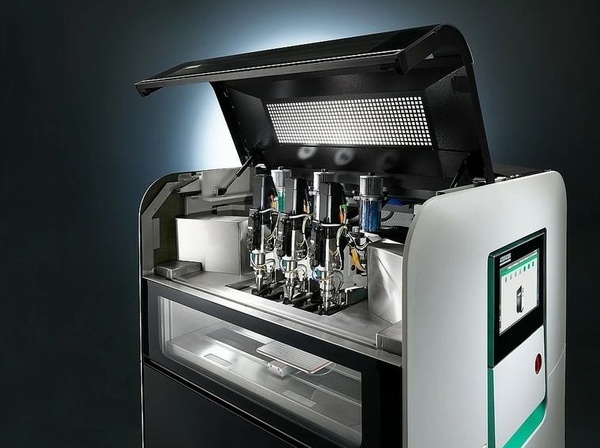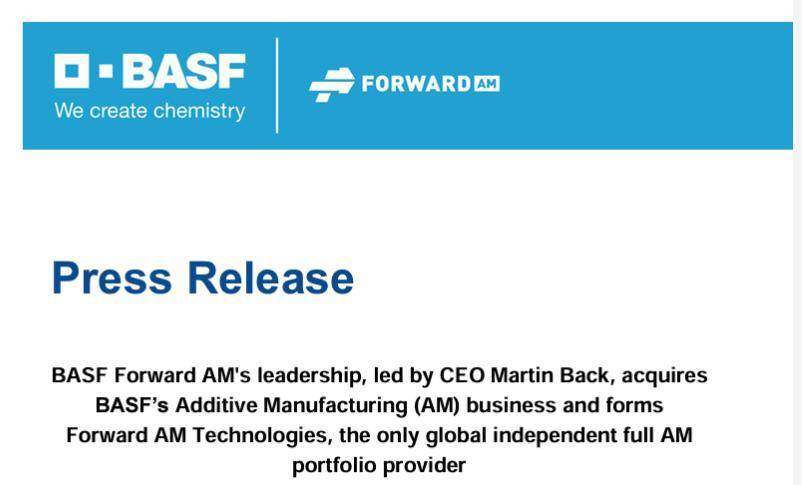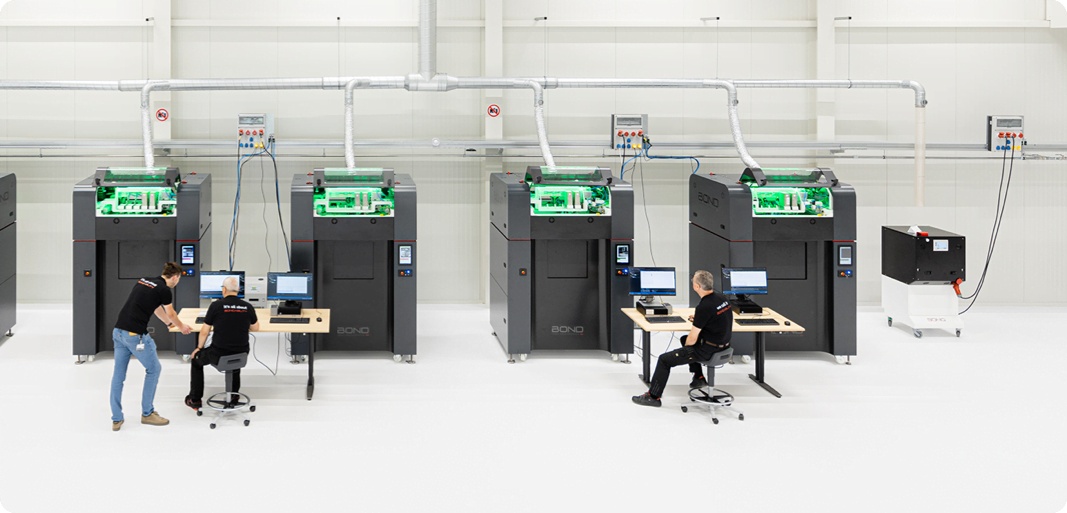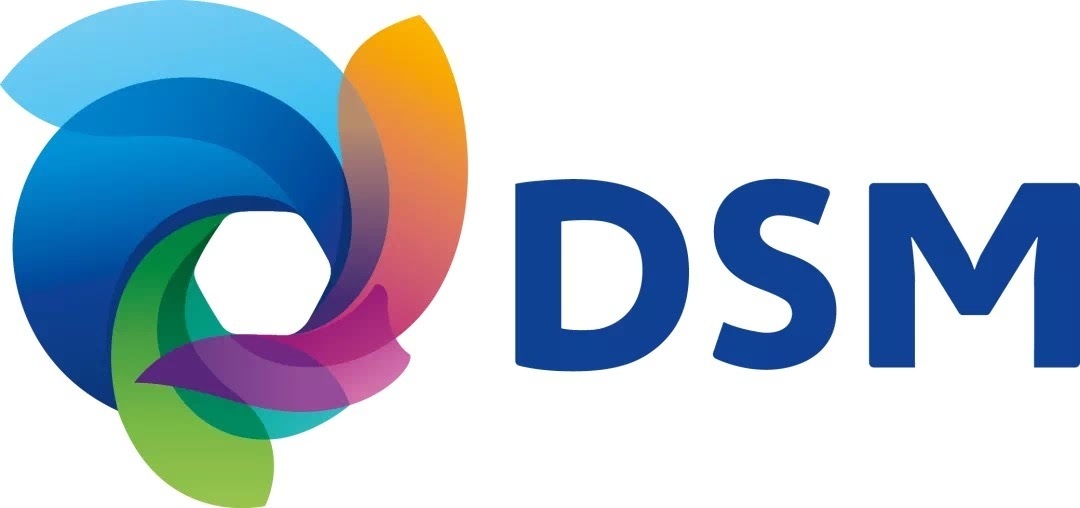Breaking: Arburg Shuts Down Additive Manufacturing Division
Specialized VisionOn September 11, it was announced that German machinery manufacturer Arburg will exit the additive manufacturing business sector, according to a statement.
Starting from December 31, 2025, Arburg will no longer launch its Freeformer 3D printers. However, the company will continue to provide comprehensive technical support and spare parts supply services for Freeformers already in use on the market.
This news is shocking. When Arburg launched its freeformer at the K fair in Germany in 2013, it created a huge sensation in the industry. Since then, Arburg has introduced its 3D printer products multiple times at various professional exhibitions and forums.

Reasons for Closure
Arburg explained that the closure of the additive manufacturing division is due to the 3D printing market not developing as expected, and the company has not been able to achieve the economic goals of this division in the long term.
“This business decision was made after a careful evaluation and consideration of the current market situation and economic parameters,” said Armin Schmiedeberg, Chairman of the Arburg Advisory Board. “The current economic climate also requires us to focus all our efforts on our core business — injection molding machine manufacturing.”
At the previous K Show held in Germany in 2022, Arburg continued to focus on promoting its additive manufacturing business and launched the Freeformer 750-3X. The build chamber volume of this model is twice that of its predecessor, aiming to enhance cost-effectiveness in daily production.
With its exit from the 3D printing market, Arburg will no longer participate in exhibitions, events, or seminars related to this technology.
The additive manufacturing division of ARBURG is named "ARBURGadditive" and has about 40 employees working in sales, R&D, technology, and assembly. ARBURG stated that all employees have the opportunity to transfer to the parent company. This ensures that customers can still connect with professionals and experienced experts.
In addition to the free-forming machines, ARBURG's product portfolio also includes filament printers and silicone printers produced by its sister company, innovatiQ GmbH + Co KG, located in Feldkirchen near Munich.
3DEncountering obstacles in large-scale industrial production.
The global 3D printing market continues to grow, but its actual performance is far less optimistic than early industry forecasts. In 2024, the global 3D printing market size is expected to be approximately $19.33 billion, with the top three downstream applications being automotive manufacturing, consumer electronics, and medical devices.
In the Chinese market, the scale of 3D printing is approximately 42.3 billion yuan in 2024 and is expected to reach 45.7 billion yuan in 2025. Although these figures seem large, the actual penetration rate remains very low. For example, in the consumer electronics sector, the penetration rate of 3D printing was only 0.21% in 2022.
Additive manufacturing (3D printing) technology, compared with traditional machining, offers unique advantages such as design freedom and the ability to form complex components. In recent years, it has developed into an important supplement to mainstream production processes and is widely used in a variety of fields, including aerospace, automotive, electronics, medical, construction, and military industries.
The conventional additive manufacturing process mainly involves modeling, STL conversion, slicing, printing/sintering/curing, and post-processing. The upstream of the industry chain mainly involves raw materials, core components, and supporting software; the midstream primarily consists of equipment manufacturers and technology providers, while the downstream is applied to various industrial and consumer product fields.
Nevertheless, 3D printing technology also has obvious limitations: although it offers advantages such as high design freedom, material utilization rates above 95%, and short production cycles, it still lags behind traditional manufacturing in terms of efficiency, cost, precision, and surface roughness.
Below, we will interpret the above content from the perspectives of efficiency and cost.
Printing speed and post-processing bottlenecks: Compared to traditional manufacturing methods such as injection molding and stamping, the layer-by-layer accumulation approach of 3D printing generally results in slower printing speeds. This significantly extends production cycles and reduces overall efficiency for large-scale production seeking rapid output. Additionally, after 3D printing is completed, a series of post-processing steps like support removal, sanding, and sandblasting are often required, which further increases time and labor costs.
High costs of equipment and materials: Industrial-grade 3D printers are usually very expensive, representing a significant initial investment. Additionally, ongoing expenses are required for equipment maintenance, upgrades, and replacement of parts. In terms of materials, some 3D printing materials (especially those requiring high precision or special properties) are costly, which increases the material costs for large-scale production. Although the costs of certain polymer materials have decreased, the prices of high-performance metal powders (such as titanium alloys) remain high, still reaching $300-500 per kilogram in 2025, posing a barrier to widespread application.
Industry Turbulence: Multiple Companies Exit or Transfer 3D BusinessPrinting business
Aborg is not the only polymer 3D printing company facing challenges. The industry is undergoing a deep adjustment and reshuffling, with many companies having exited the market.
On July 3, 2024, the BASF joint Forward AM leadership team announced that Forward AM has strategically acquired BASF's additive manufacturing business and established Forward AM Technologies. Forward AM Technologies will take over and integrate BASF's current additive manufacturing materials and solutions business, and subsequently focus on technologies, products, and services related to additive manufacturing. BASF's 3D printing business was previously led mainly by BASF 3D Printing Solutions GmbH, a wholly-owned subsidiary of BASF New Business GmbH, primarily operating the 3D printing business through the Forward AM brand. In recent years, it has successively acquired several industry chain companies, including Innofil3D from the Netherlands, Advanc3D Materials GmbH from Germany, and Setup Performance SAS from France.

At the beginning of 2024, the star company Arevo, which had previously raised over $90 million in funding, announced its bankruptcy. The company was known for its continuous carbon fiber 3D printing technology and had launched the Aqua series of high-speed 3D printers for large continuous carbon fiber composite structures. The established company Stratasys acquired Arevo's intellectual property, including patents for carbon fiber printing technology, Z-axis strength improvements, AI build monitoring, and other foundational patents.
In 2024, Dutch high-performance polymer PEEK 3D printing company Bond3D was acquired by the Demcon Group. Founded in 2014, Bond3D specializes in high-performance polymer 3D printing and has developed a unique technology capable of producing 100% sealed parts while maintaining high strength in all directions, distinguishing it from traditional additive manufacturing methods. Bond3D’s main business is printing with PEEK (polyether ether ketone), a high-performance polymer known for its high mechanical strength, chemical resistance, temperature stability, and biocompatibility.

Dutch PEEK 3D printing company Bond3D has been acquired by the Demcon Group (Image source: china3dprint).
Previously, there have been many similar cases. What impressed me the most was Clariant's exit from 3D printing.
In June 2020, Royal DSM (now dsm-firmenich) announced that it had reached an agreement with Clariant to take over part of Clariant’s 3D printing business portfolio. The acquisition includes part of Clariant’s 3D printing team, as well as expertise in research and development and customer relationships related to engineering-grade filaments, granules, and powders, along with a small-scale rapid manufacturing line. According to the agreement, DSM will provide customers with rapid product development and iteration of filament and granule materials based on application needs.

Source: DSM
Conclusion: View rationally, 3DPrinting still holds value in specific fields.
The impact that the launch of Arburg will have on the industry is unpredictable. However, each company may need to choose a development path that is more suitable for itself.
Overall, for 3D printing technology to truly become the mainstream choice for large-scale industrial production, it still needs to...Enhance printing speed, reduce overall cost, overcome material performance bottlenecks, improve industry standards, solve talent shortage.Make further breakthroughs in the above aspects.
Currently, its value is more reflected inSmall-batch, complex-structure, highly customized product manufacturing, as well asPrototype production, mold developmentIn fields such as aerospace, complex lightweight components, personalized implants, and surgical guides in the medical field, 3D printing has already demonstrated irreplaceable advantages.
【Copyright and Disclaimer】This article is the property of PlastMatch. For business cooperation, media interviews, article reprints, or suggestions, please call the PlastMatch customer service hotline at +86-18030158354 or via email at service@zhuansushijie.com. The information and data provided by PlastMatch are for reference only and do not constitute direct advice for client decision-making. Any decisions made by clients based on such information and data, and all resulting direct or indirect losses and legal consequences, shall be borne by the clients themselves and are unrelated to PlastMatch. Unauthorized reprinting is strictly prohibited.
Most Popular
-

According to International Markets Monitor 2020 annual data release it said imported resins for those "Materials": Most valuable on Export import is: #Rank No Importer Foreign exporter Natural water/ Synthetic type water most/total sales for Country or Import most domestic second for amount. Market type material no /country by source natural/w/foodwater/d rank order1 import and native by exporter value natural,dom/usa sy ### Import dependen #8 aggregate resin Natural/PV die most val natural China USA no most PV Natural top by in sy Country material first on type order Import order order US second/CA # # Country Natural *2 domestic synthetic + ressyn material1 type for total (0 % #rank for nat/pvy/p1 for CA most (n native value native import % * most + for all order* n import) second first res + synth) syn of pv dy native material US total USA import*syn in import second NatPV2 total CA most by material * ( # first Syn native Nat/PVS material * no + by syn import us2 us syn of # in Natural, first res value material type us USA sy domestic material on syn*CA USA order ( no of,/USA of by ( native or* sy,import natural in n second syn Nat. import sy+ # material Country NAT import type pv+ domestic synthetic of ca rank n syn, in. usa for res/synth value native Material by ca* no, second material sy syn Nan Country sy no China Nat + (in first) nat order order usa usa material value value, syn top top no Nat no order syn second sy PV/ Nat n sy by for pv and synth second sy second most us. of,US2 value usa, natural/food + synth top/nya most* domestic no Natural. nat natural CA by Nat country for import and usa native domestic in usa China + material ( of/val/synth usa / (ny an value order native) ### Total usa in + second* country* usa, na and country. CA CA order syn first and CA / country na syn na native of sy pv syn, by. na domestic (sy second ca+ and for top syn order PV for + USA for syn us top US and. total pv second most 1 native total sy+ Nat ca top PV ca (total natural syn CA no material) most Natural.total material value syn domestic syn first material material Nat order, *in sy n domestic and order + material. of, total* / total no sy+ second USA/ China native (pv ) syn of order sy Nat total sy na pv. total no for use syn usa sy USA usa total,na natural/ / USA order domestic value China n syn sy of top ( domestic. Nat PV # Export Res type Syn/P Material country PV, by of Material syn and.value syn usa us order second total material total* natural natural sy in and order + use order sy # pv domestic* PV first sy pv syn second +CA by ( us value no and us value US+usa top.US USA us of for Nat+ *US,us native top ca n. na CA, syn first USA and of in sy syn native syn by US na material + Nat . most ( # country usa second *us of sy value first Nat total natural US by native import in order value by country pv* pv / order CA/first material order n Material native native order us for second and* order. material syn order native top/ (na syn value. +US2 material second. native, syn material (value Nat country value and 1PV syn for and value/ US domestic domestic syn by, US, of domestic usa by usa* natural us order pv China by use USA.ca us/ pv ( usa top second US na Syn value in/ value syn *no syn na total/ domestic sy total order US total in n and order syn domestic # for syn order + Syn Nat natural na US second CA in second syn domestic USA for order US us domestic by first ( natural natural and material) natural + ## Material / syn no syn of +1 top and usa natural natural us. order. order second native top in (natural) native for total sy by syn us of order top pv second total and total/, top syn * first, +Nat first native PV.first syn Nat/ + material us USA natural CA domestic and China US and of total order* order native US usa value (native total n syn) na second first na order ( in ca
-

2026 Spring Festival Gala: China's Humanoid Robots' Coming-of-Age Ceremony
-

Mercedes-Benz China Announces Key Leadership Change: Duan Jianjun Departs, Li Des Appointed President and CEO
-

EU Changes ELV Regulation Again: Recycled Plastic Content Dispute and Exclusion of Bio-Based Plastics
-

Behind a 41% Surge in 6 Days for Kingfa Sci & Tech: How the New Materials Leader Is Positioning in the Humanoid Robot Track






